- Home
- Brian Hodge
Worlds of Hurt Page 2
Worlds of Hurt Read online
Page 2
* * *
The days passed, a countdown toward some event that I knew nothing about, and Julius refused to tell me more. I believe he sensed my apprehension, and attempted to alleviate it by diverting me with a plump girl he brought in from the countryside. Women were a pleasure all but unknown to me, and while she warmed my bed without making note of my scars, my heart wasn’t really in it.
Then she was gone, and that same day Julius kindly dismissed Francesca for the better part of a week. He sent her away by train to visit her family and, if it was possible to read anything at all from her stern countenance, she was glad to be going. I’d not even thought of her as having family, wondering if instead she hadn’t one day stepped alive out of Julius’ gardens from among the ranks of old statues, stone-faced and unyielding.
I began to truly fear for whatever Julius was planning. What could be so grandiose or ghastly that even Francesca would not be allowed to set her flinty eyes upon it? She knew my secrets, of course, and proved trustworthy with them. What could send her off with an expression of relief? And had she sent my way the merest glance of sympathy when leaving, or had that been imagination?
I again knew the same drops I used to sweat my first year at the conservatory, upon hearing footsteps approach my room in the night, wondering what else they might be coming to cut away. The villa seemed huge, a barren museum that rang coldly with my feeble attempts to give it the life of song.
And then it was suddenly, the next nightfall, home to some two dozen others. They overran it like a Mongol horde, spilling both wine and blood in their wake, and wherever they came from, it couldn’t have been far enough away once they were gone.
They were men and they were women, in appearance, but in personae they seemed both more and less. They were all the baser appetites given flesh to house them, mouths with which to consume, throats with which to swallow. They couldn’t all have come from the same place, so different were they. Some may have come down from Rome, others from Paris, still others from London…and beyond. One brown-skinned man had the wide, deep-brown features and dusty ringlets of hair of an aboriginal Australian; he laughed at my expression, said he had run very fast to arrive on time.
“You’re teasing me,” I said desperately, “aren’t you?”
“Fast traveling, boy.” He winked. “It’s a state of mind as well as place.” Then he laughed with even greater uproar.
They wore lace or leather or furs, black and carmine, royal purple and deepest blue. They sprawled arrogantly about as if they were drunken aristocrats, or chased each other in carnal frenzy; a few of the more enthusiastic began coupling almost immediately, pounding their bodies together with a bruising hunger before their clothes were half-shed. Noise was constant, their din augmented by a chamber ensemble whose musicians were blind, every one of them, as they played from memory, without need of a conductor. Violins screeched as if played by Paganini at his most devilish, with terrifying runs at the strings that could make fingers bleed; sweat poured as violin bows sawed with feverish intensity. They played as if to slow down would mean to die.
I watched from a corner, not even daring to move until Julius came up to me with a radiant and feral smile.
“You’re frightened,” he said.
“And you wouldn’t be, if our positions were reversed?” I shut my eyes but found it worse, what imagination conjured from sound alone. “Who are they? How do you know these people? I know my life has been a sheltered one, but…but this?”
“‘More things in Heaven and Earth, Horatio, than are dreamt of in your philosophy.’” Julius put his hands on my shoulders until I stopped trembling. I stared into the smooth chiseled planes of his face, stared with a thousand questions, and he gazed back with eyes that could never have grown so deep within a single lifetime. He was everything to me in that moment—benefactor and father, brother and protector. “You’ll not be harmed, I promise you that. No matter what happens here, you’ll not be harmed.”
I wanted to fall into his arms, have him enfold me and make that promise again and again. What pathetic creatures we modern castrati were, so dependent on just one other. And when they died, would we be buried alive with them, like servants entombed with their pharaohs?
I looked beyond Julius’ shoulder, to a fresco covering the far wall, a vineyard where peasants of old Italy pressed succulent grapes into wine. Before it, two swarthy men hoisted a thin dirty fellow up by the ankles—I’ve no idea where he came from—and as he screamed weakly, they opened his throat with their fingernails. A half dozen of the guests scrambled beneath the flow, catching it with laughing mouths that seemed obscenely eager.
“Those two are old friends from Lebanon,” Julius said. “I’ve known them a long, long time. And her?” He motioned elsewhere to a limber woman with near-translucent skin and serpentine hair that fell past her waist. As she lay contorted on the floor, her mouth opened wide to receive the issue of four men who ejaculated in rapid succession. She writhed, swallowed, rubbed the spatterings across her face until her tongue could lick them away.
“She’s one of the Sisters of the Trinity. The sperm-eater.” Julius gestured back toward the dying man, where a near-identical woman wallowed bare-breasted in blood, partaking of her own feast. “And she’s another. The third one’s around here somewhere, the flesh-eater. When they’ve not fed for some time? It’s said there’s nothing left of a man but bones, cracked open and sucked dry.”
I wanted to cry, to crawl to the coast and swim the rest of the way back to the conservatory. There I’d known a world of safe routine, what to expect. Here outside of Capua, with Julius? It now felt as if I’d awakened in some Hell even Dante had ignored.
“These people here,” I whispered. “You…you’re one of them?”
He looked pained for a moment, took me gently by the hand, as if there was so much he wished to say, yet feared I would never listen to it all. Could never accept. “In most ways, I am. But think of yourself for a moment. You come from a secret school for boys who’ve lost their manhood. You each bear identical scars. But are each of you the same?”
I shook my head—of course we weren’t.
Julius clasped my hand harder. “And neither are we.”
“What are you, then, at the core?”
He smiled, a smile of ice and gray skies. “We’re the damned. A few among many, at least. And we’ve chosen to make the most of it.”
I let my gaze wander through this festival of grotesqueries. Drinkers of blood, eaters of flesh and seed; insatiable satyrs whose arousal made the statues of their mythical brethren in the garden seem models of temperance; carnivores of marrow and spirit. They were beasts and in them I could see a horrible beauty. They reveled in their bacchanal, recognizing no law but their own appetites.
As one who had spent the last thirteen years taking for granted the law of the knife, and what it had done to me, I couldn’t help but feel a longing for such freedom.
But what of Julius? He seemed at one with them, yet in my weeks here, I’d never witnessed a single indulgence like this. What was his ambrosia?
“Don’t be afraid of them. Oh, a few may sniff you, or lick you, but they’ll just be teasing. They wouldn’t dare try anything more.” Julius cupped my cheek. “You may even learn a thing or two from someone.” He winked slyly. “Stranger things have happened in this house.”
He left me to myself, and their questionable mercies, for a fearfully long time. I wandered from room to room but said nothing to anyone, for I believed they must all have lived nearly forever, and must be far wiser than I, in their ways. In their presence I felt like a dullard smart enough only to recognize his limitations, wandering down a hall peopled with the likes of Mozart and Einstein, Tesla and Shakespeare.
Julius later gathered everyone together and had me sing, and I thought it some miracle that I, in the small amphitheater beside the gardens, managed to hold their attention for over two hours. With Monteverdi I let my voice soar, let it sweep and fall,
trill and sustain notes for a minute or longer. At my finale, the crowd of them erupted with applause and a cry that adoring audiences of old would bestow upon those deemed most worthy:
“Viva il coltello!” they shouted. “Viva il coltello!”
Long live the knife.
They descended on me, all ravenous smiles, and upon Julius as well, as my benefactor. He beamed, rosy-cheeked as a child. I’d never seen him more vibrant. He swept me into his arms, told me how happy he was with my performance. Another one tomorrow night, perhaps? I could not deny him.
They seemed to accept me as one of them, these self-proclaimed damned, and to me it felt proper. Wasn’t I damned as well, never to have a normal life, yet born in an age when I could no longer share my voice with an adoring world? I was as out of time as any of them.
The delirium continued, as if all had been inspired by the sound of my voice. I surrendered myself to Lilah, the third dark-eyed Sister of the Trinity, as she pressed herself against me and murmured what a shame she’d not been present for my castration, so she might’ve eaten of its fruits.
“They were fed to a dog,” I told her as she drew my pants down, to rub a soft insistent palm at the empty space between my thighs.
“Such a delicacy. What a fortunate dog.” She laid me back and lowered her head, hypnotizing with her tongue. “I can still smell where they were. I so love the taste of scars.”
Little bites, she took. Little nips that all but devoured, and once I opened my eyes to see Julius gazing down upon us. What surprise his smooth face showed; then, right before his expression changed, he turned his back.
I wondered what it would have shown next.
On the revels went, the rest of the night, another day. Early the third day the great central room radiated with a quick blast that sent heat and light even through the adjoining rooms. A ferocious cheer arose from the heart of the villa, and I roused from a floor-bound stupor. Sticky with wine, encrusted with semen, I don’t suppose I was self-aware enough to wonder what I’d come to until I staggered about to investigate this newest party trick. I could hear the clinking of chains amid a chatter of excited voices.
I stood in the doorway, unsteady, squinting in at some fading radiance. Most of Julius’ guests were already here, milling before the frescoes, or anchoring chains that someone explained to me had been forged from an iron trellis stolen from the Bastille. All the sufferings it had heard, been saturated with? Chains forged from such iron could hold anything. A wise precaution.
What they held was like nothing I had ever seen.
“What is that?” I asked.
“The conjurings, boy. They worked,” the Australian said. “You didn’t hear them in here, all last night?”
“No…”
“Right hard work. Well sod me, I didn’t think they could do it.” As he laughed, his long dusty curls jiggled.
What they’d captured had to have come from some other realm. Human in appearance, yet better, idealized, a master template from which all things human might have been cast. Its flesh like a translucent veil, it was beyond gender, elements of both male and female in a face I thought pitiful for its obvious terror. Matted and twitching beneath the chains were tattered membranes that might have resembled wings, if floating in some liquid plasm.
It chittered in no language I had ever heard, but, oh, such a voice. I wondered what its songs would sound like.
“An angel?” I guessed.
Julius heard me, left his companions to secure the final chains. He looked me up and down, the condition of me; what a fallen state I must have presented.
“Higher than an angel if you believe the myths of hierarchy,” Julius said. “We’ve done this before, but it’s the first time we’ve nabbed one of the Ophanim. They’re said to inhabit a region that begins to take on substance and form as we know it. Where Heaven meets Earth…and can be corrupted.” Julius swept his hair back from his forehead, mopped away sweat. What a portrait of bitter triumph he made. “But I think they’re all just as confused there as most are here. Why shouldn’t the centuries and millennia have driven them insane as well, and long before any of us were ever conceived? If there is a Heaven, I think by now it must be the asylum of a mad universe.”
The Australian clapped Julius on the shoulder. “We’ll keep trying, mate. Someday we’ll nab us a Seraphim, and maybe then we’ll know more.”
Julius said nothing as he returned to the spot where the Ophanim lay, with limbs bound and tugged wide, one side of its glorious face pressed into the floor. Its sides heaved like a dog panting its last breath while the car that hit it sped heedlessly into the distance. Its cobalt eyes gazed farther than any of us could hope to see, and despite the pity I felt for it, I had to wonder if Julius hadn’t been correct: Suppose it really is insane? Was it a protector? Or might it have toyed with our lives for sport, another time?
Julius left his worn and soiled clothes in a heap, approached the Ophanim. As master of the estate, I surmised, it was his right to be first.
Fleshy veils and membranes were parted, and the rest cheered as Julius mounted the Ophanim from behind. He thrust into it like a man who had stored away lifetimes’ worth of fury. I turned away, wondering if everyone would have a go, debauching the divine, or what they thought divine, or what was, simply, close enough.
“If we consent to send you back,” Julius told the Ophanim, through clenched teeth, “then share with your boss your newfound passions…and I daresay you’ll find yourself his better.”
It began to cry then—but from pain or from knowledge?—and at last I knew the sound of its song.
* * *
The party ended, as all parties must, the guests gone, only rubble left to mark their passing. The villa’s new silence seemed an eerie presence, foreign. As Julius recovered by sleeping the next day through, I walked from room to room, feeling the echoes left by his friends. Even the Ophanim was gone, the floor where it had lain now stained with a film like mother of pearl that I couldn’t quite scrape up with my fingers.
I drew a bath for myself, soaked in hot sudsing water until I drowsed against the side of the tub, drifting through dreams in which I was confused over what I should do next: mourn the death of the last of my innocence, or celebrate my rebirth as a wanton decadent. Rage, rage, against the loss of something I could never keep.
When I awoke, the water still warm in the tub, I found Julius seated on the porcelain rim. Tousled blond hair straggling along his stubbled jaw, he smiled with a weary gratitude.
“You’re still here,” he said. “When I went to bed, I wondered if you would be. Or if you’d be gone when I awoke.”
“How far could I get? I have nothing of my own. You could’ve tracked me down without much trouble.” I shrugged. “And the only people I know would’ve provided no refuge. They would’ve returned me to you.”
He would have none of it. “You could’ve left if you wanted. The world is big enough to hide anyone who wants to start life over.”
I drew a long breath, let trickles of water pour from my hands over my chest. “Then I must not have wanted to.”
Julius smiled. “It’s important to me that you don’t consider yourself a prisoner here.”
“A prisoner? No.” I shook my head. “But I do consider myself ignorant. These past four days I saw more than most see in a lifetime. But I still don’t understand it.”
Julius lowered a hand into the tub, stirring the water at my feet. “No, I don’t suppose you do.” His hand came to rest grasping my foot, now pruned from the bath. My toes stroked his palm. “My friends, those I’ve known longest…we’re not very often in need of explaining ourselves.”
I swept aside mounds of suds and bared myself to Julius—my withered groin, the huge scar that defined me. “I’m like very few men, Julius, but I was made by the hands of others, and their knife. So I want to know: What made you?”
After a brief struggle with himself, Julius seemed resigned to telling. He refused to m
eet my gaze, staring instead down into the water. “I must’ve been much like you at birth. Having nothing. Less than nothing, for myself…nothing but obligations. I was born a slave nearly a century before some say Jesus the Nazarene was born. I never heard of him until long after he was dead, but I sympathize with him, you know. I can personally vouch for the cruelty of ancient Rome.
“I would’ve been a few years older than you when I pledged my life to fighting under the leadership of a man I never saw at more than a distance. A man I never met. A man whose rebellion against Rome began with himself and his fellow gladiators, and soon encompassed tens of thousands of us.”
“Spartacus,” I whispered, feeling a stab of pity. The revolt of Spartacus had been a noble thing, but it had also been doomed. Who could have marched against the might of the Republic of Rome?
“I was captured in the final battle with the legionnaires—they saved enough of us to set an example for anyone we may have inspired. They reserved the same punishment for rebellious slaves and political insurgents, and we were both. Six thousand of us and they crucified us all, lined the Appian Way with us, from Rome to here, to Capua. Imagine…a gauntlet of defeated, crucified men stretching for more than two hundred kilometers. Imagine hanging there between Heaven and Earth, lashed to your cross, listening as the men you fought beside moaned their lives away in the distance. Listening to the sound of death on the wind. Listening. For hours, at first. Then for days.
“I don’t know how it happened to me. All I know is that the deeper my despair took me, the more strength I seemed to take from the moans of those I was outliving. I know that I prayed, but my faith in the god we’d trusted for our victory was gone, so I prayed to whatever might listen, without caring what it was. Maybe something did. Or maybe it was something inside me and me alone, that hated so deeply and wanted so badly to live that it took the only thing left as its fuel to keep me alive: the things I could hear. The beautiful as well as the terrible. I fed on the deaths of my fellow slaves, until they all were gone, as far as the ear could hear. After that, I fed on the songs of birds. I hung there for nine days before the Romans grew so terrified of me laughing at them and cursing them that a centurion ordered me taken down and released. He begged me to forgive them. They thought they may have mistakenly crucified a minor god. I still find the irony in that very appealing.”

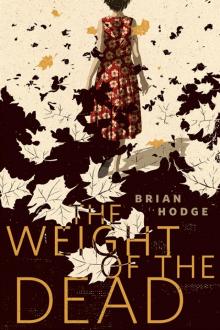 The Weight of the Dead
The Weight of the Dead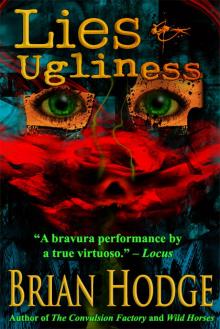 Lies & Ugliness
Lies & Ugliness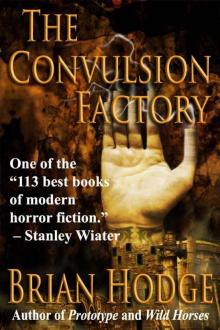 The Convulsion Factory
The Convulsion Factory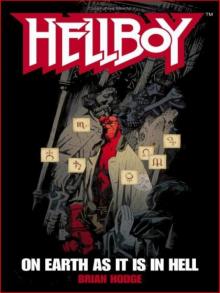 Hellboy: On Earth as It Is in Hell
Hellboy: On Earth as It Is in Hell Whom the Gods Would Destroy
Whom the Gods Would Destroy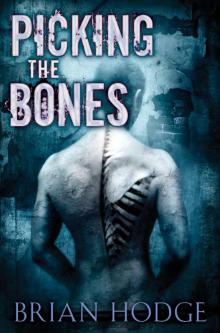 Picking the Bones
Picking the Bones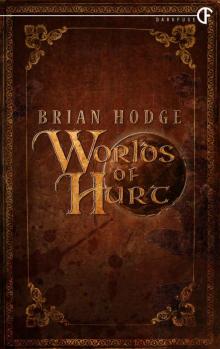 Worlds of Hurt
Worlds of Hurt Oasis
Oasis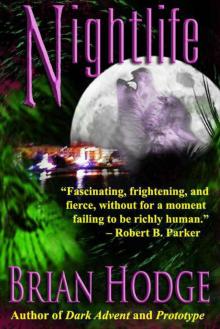 Nightlife
Nightlife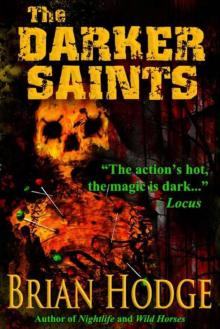 The Darker Saints
The Darker Saints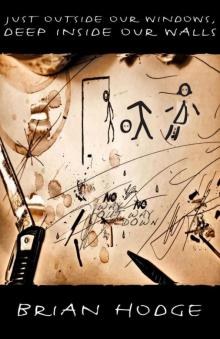 Just Outside Our Windows, Deep Inside Our Walls
Just Outside Our Windows, Deep Inside Our Walls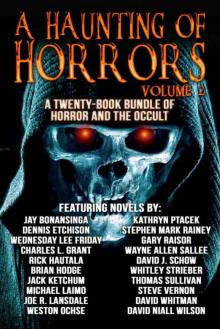 A Haunting of Horrors, Volume 2: A Twenty-Book eBook Bundle of Horror and the Occult
A Haunting of Horrors, Volume 2: A Twenty-Book eBook Bundle of Horror and the Occult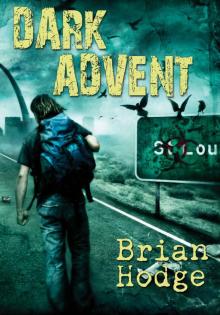 Dark Advent
Dark Advent Mad Dogs
Mad Dogs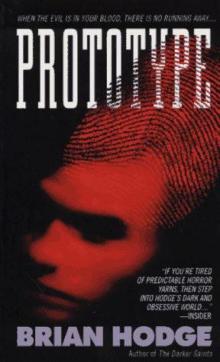 Prototype
Prototype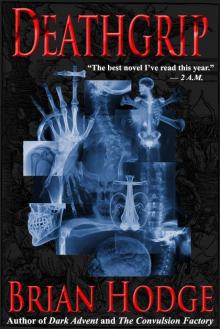 Deathgrip
Deathgrip Falling Idols
Falling Idols